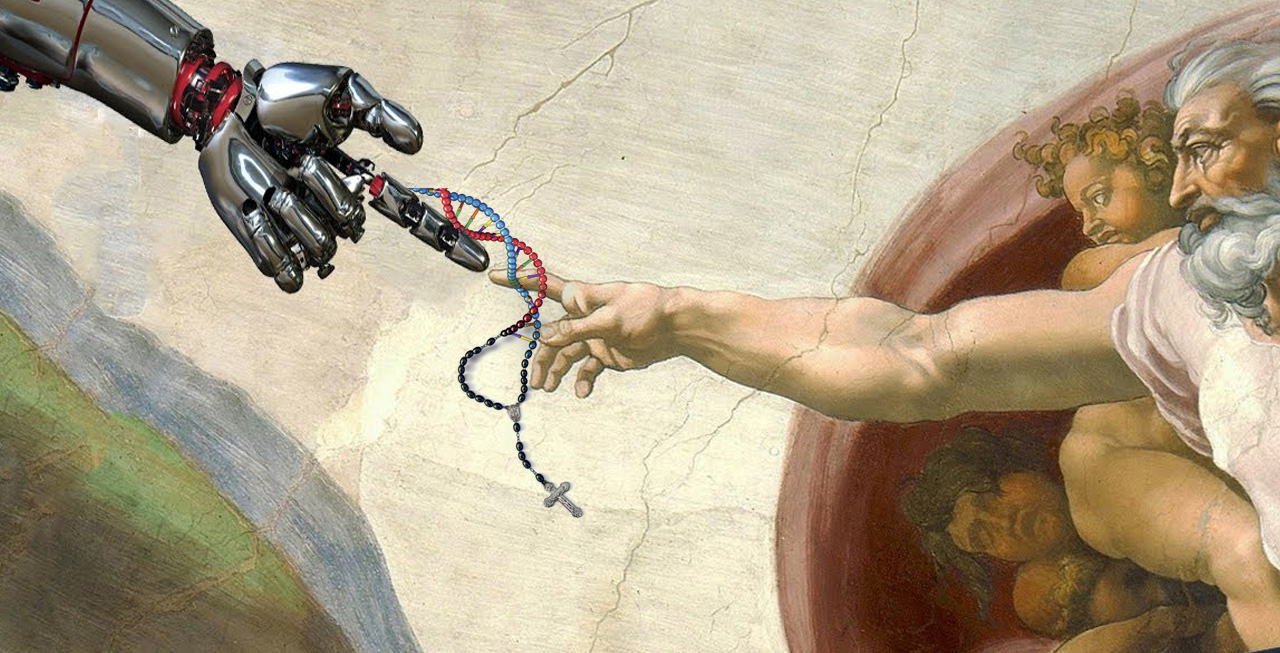First a few questions about the biblical account.
1. Do you accept that science understands genetics well enough to be trusted on the matter of genetic bottle necking? That it isn’t possible that there was ever a time when there was just two human beings alive, and a minimum population would be at least 50 individuals? The problems with limiting the gene pool are well understood and that evolutionary theory says entire populations of primates evolved not just two individuals.
2. If you accept the science, then do you understand that means Adam and Eve could not have been the literal first two humans?
3. Do you recognize that the story about the “fall of man” and every human born since being a descendant of Adam and eve is a scientific impossibility?
4. Do you think that the concept of substitutional atonement whereby children are held to account for the actions of a parent, or where a person can take the place of another when being punished is morally justifiable?
5. If the whole point of Jesus’ sacrifice is for all who accept it to be saved from the results of an original sin that they did not commit, and in fact was just an ancient myth, then are people being saved from nothing real at all? If you think Jesus’ sacrifice does save his followers from some real danger, what is it? And how can we know it to be true in a way that is convincing enough to warrant believe?
—————————————————————————————————–
Another line of questions regarding the god of the bible.
1. If we Google the distance between Giza Egypt and Jerusalem Israel as the crow flies it’s only 267 miles. At just five miles per day which is what we’re supposed to walk on average just to be healthy, it would take just 53 days to make the journey on foot. How do you explain that with God’s help it took the freed Israelites 40 years?
2. Considering that no historical archaeological evidence has been found for the three to four million people that were supposedly freed according to the Bible and then we’re lost in this desert for four decades, and they were being led by Moses who shares his birth story with several other ancient legends, and is thought not to have really existed by most scholars, basically confirms that at least the first 5 books of the bible are mythical. Isn’t it true that any claims of prophecy in the new testament about Israel cannot be supported as true if there was no promise land in the first place?
3. Seeing as the earliest copies of the New Testament were written several decades after the life of Jesus, all of the prophecies are written from a historical perspective told to us as though they had happened in the past, told to us that Jesus fulfilled these prophecies not as predictions for a future. Jesus tells us in his own words that all of this shall come to pass in the lifetime of those hearing his voice. He believed that the world was ending, and he told us so. He was uneducated, grew up in time where everyone believed in supernatural mumbo jumbo, had no access to scientific thinking, and was making his predictions based on the popular beliefs of his ancient Jewish brethren that turns out to be a myth. Why do you think its true?
—————————————————————————————————
a set of questions focused on the concept of a generic creator god.
1. Do you accept that everything we see coming into existence is actually a rearrangement of preexisting matter?
2. Do you accept that we have never seen any thing made of matter that was “created from nothing”?
3. Do you understand that Einstein’s theory of relativity means space and time are connected so that you can’t have one without the other? And that according to scientists we call the fabric of our universe spacetime? And that time came into being at the beginning of the universe when we can say time T=0? And last that speaking of things before time began is nonsensical?
4. Do you agree that to measure any change of state for any material requires time? And that any act of doing something must take some amount of time. If all action is by definition necessarily temporal then how is an act of creation by a diety any different?
5. If an act of creation requires time but before the universe existed there was no time for an act of creation to occur then it is not possible for the universe to have been created.
6. Which is more likely, that an impossible timeless creation event took place, or as the science would suggest all of the matter in the early universe preexisted in a state of singularity but was not created from nothing. The singularity could even be the remnant of a previous universe, and there could even be a multiverse, neither of which relies on positing a supernatural creator being?
7. While we don’t know every little detail about the origins of the universe we do understand quite a bit going back all the way as far as the Planck time. We also understand a great deal about the formation of our solar system and our planet from the process of gravitational accretion. Abiogenesis as a theory for how life arose may not be completely understood, but provides a plausible hypothesis for the beginning of life, while evolution, the most supported theory in the history of science perfectly explains the diversity of life on earth and the origins of humanity. Is “a god did it” not just a statement without any explanatory power at all? What good reason is there to believe it?
——————————————————————————————–
questions about the concept of a soul
1. Would you agree scientific inquiry points to the fact that our memory abilities including storage, recall, and capacity, can be shown to be related to our brain, and they can be mapped to specific regions of our brain and can be easily disrupted via damage to those corresponding parts of the brain?
2. Do you think it is safe to say that the capacity to perceive signals of light via our eyes, and translate that into meaningful data is a somewhat well understood function of the brain and that it too can be mapped to a particular region of the brain (the visual cortex) that if damaged stops working to properly process visual stimuli?
3. Are you aware that using an MRI we can look at activity in the brain which confirms that the same is true for our other senses as well, hearing, taste, touch, etc. can all be mapped to their own unique regions of the brain?
4. Did you know that specific experiences and unique emotional states are also identifiable on an MRI scan, meaning looking at an MRI, we can recognize happy, stressed, even certain types of psychosis, and that the experience of feeling love is in fact what scientists would say maps to a particular brain state. A certain pattern of elctro-chemical activity that shows up on an MRI reflects the brain state we call love; another for hate, one for fear, and so on?
5. Did you know that we can induce religious experiences as well as out of body experiences reproducibly? There is a famous test where a note is placed on top of a light fixture or the top of a cabinet in an operating room, then when a person reports an out of body experience they ask them what the note says, and even in the cases where they told the person in advance that the note was up there, never was the message on the note relayed correctly, not even once! isn’t it funny that when people have any kind of an experience they think is supernatural, they never gleaned any useful and verifiably true information that wasn’t already known?
6. Science has been rigorously looking for the soul for 300 years and today we have nowhere else to look. A person with brain damage can have their entire personality changed completely, or even erased. There are examples of theists who were devout believers who after getting amnesia and forgetting what they believed, refused to accept what other people told them they used to believe because according to them now it seemed ridiculous that they would have accepted those religious claims as true. I wonder if their soul were real will they go to heaven or hell?
7. If you believe in a soul and that it is eternal, and somehow placed in a fetus right at the moment of conception, then when a zygote happens to split into twins during the early stages of development the soul would be preexisting, so does it split in two? Does another soul come along later than conception? which twin gets it? Then, in those cases where one twin is absorbed by the other to the point where there are just a small amount of the other twin remaining like extra teeth with a different DNA (they would have been fraternal twins) does the remaining living person have two souls? If not does one go to heaven or hell before the death of the body containing their still living tissue? (living without a soul)
8. In the 1960’s doctors trying to cure epilepsy and schizophrenia would sever the corpus callosum connecting the two haves of the brain. It was then that the whole multiple personalty syndrome started to have some light shed on it scientifically. As it turned out each half of the brain has at minimum one personality within it. The left side controls the speech and can voice its opinion, while the right hemisphere controls the left hand which can write out messages and responses that would often contradict the spoken message. In one now famous case one side of the brain was a theist and one an atheist. Given this understanding about our internal sense of self actually being a conglomerate of multiple personalities, and the we can show multiple personalities as emergent properties of the same brain, does that mean that this person has two souls, or just one? and if it is just one, which side has it? How can we reconcile that means that half the brain functions and lives and does it without a soul, with the belief that a soul is necessary and contains our personality such that it can live on after death in some place where souls go? is it not true that if our memories and personality do not persist then nothing which we identify as the self can be seen as living on?
9. All of the peer reviewed and accepted scientific inquiry into the soul has led some to the conclusion that there is no good reason to accept the proposition that the soul is real. Knowing what we do about the functions of the brain, how can you justify belief in the soul as a real concept in a way that would be convincing to others?
10. Consciousness appears to be a byproduct of brain function when the brain stops functioning it goes haywire during the shutdown process and yields a lot of weird results, then with a lack of brain function comes a lack of consciousness. We have no examples of consciousness without a brain to generate it. By what justification do you think it is even possible for consciousness to live on absent a brain?
——————————————————————————-
Questions related to the concept of an afterlife
1. Do you believe an afterlife awaits you?
2. Do you believe the popularized Christian concept of heaven and hell is the most likely afterlife, and not that of some other religion, like the Norse concept of Valhalla and an underworld called Hel, the Muslim concept of Jannah and Jahannam, The Greek Elysium and the Greek underworld Hades, the Hindu concepts of Karma reincarnation and their underworld Naraka, any concepts from native or indigenous peoples etc.?
3. Seeing as many of these afterlife beliefs are in contradiction with each other, one can’t believe they all are true; and from what I can tell all of these beliefs have an equal amount of objectively verifiable or empirical evidence to support them, which is to say none at all; and that there is nearly identical testimonial or anecdotal evidence for each belief directly from the believers of each one, where members of each faith say things like “I just feel that it must be true;” so for an outsider evaluating all the claims, by what means can you justify belief in any one of these afterlifes over any other? And, why are you not afraid of the consequences of being sent to any other hell of any other religion?
4. Would you agree that things that rarer things often have higher value to us, the more rare, the more valuable, and as things are more and more abundant they become closer and closer to worthless? Have you heard a non-believer who assumes that we can only be sure that we get this one life and that it is finite, say that “one finite life is far more valuable that to someone who believes they will live on eternally after death in this life?” For someone who knows that they will see all their loved ones again, can you see how the motivation to see a dying family member, perhaps to make amends, or just to visit with them one last time, is diminished due to the expectation that they will in fact have plenty of time after death with those loved ones again?
5. Do you accept that people who kill in the name of god also usually believe in an afterlife? And that at least a portion of those people believe that some of those who were killed would live again anyway, be it in heaven or somewhere else, justifies their action because this one life has such a comparatively low value against the eternal life? Simplified “it’s kill ’em all and let god sort ’em out.”? Are you aware of women who kill there kids like Andrea Yates who later told us in interviews that she thought she was saving her kids from a chance to sin and thereby sending them straight to heaven? She did what she thought was the most loving thing she could based on what she was taught, and sacrificed her own eternal soul to ensure salvation for her kids. And others like, Deanna Laney (killed her kids as a test of faith), Jeanette Michelle Hawes, and many more who were deeply religous, believing not just in the afterlife but that demons are real, and in the Hawes case killing her kids as she thought they were possessed by demons. Assuming you do accept that people have and do live that think this way, can you understand what non-believers mean when we say “religion cheapens life?”
6. If you do believe in the popular view of an afterlife, do you find the concept of eternal life in the presence of a super-being you would actively worship forever to be heaven or hell?




